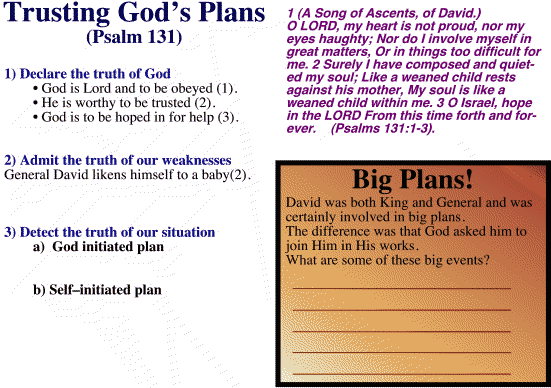- God is Lord and to be obeyed (1).
He uses the phrase 'O LORD.' Literally, it means Yahweh, the covenant God who has set before His people Laws to obey for His blessing.
- He is worthy to be trusted. (2)
In verse 2 he is alluding to the sense of peace that comes from trusting in the Lord.
- The Lord can be hoped in for help (3).
David exhorts others to "hope in the LORD."
2) Admit the truth of our weaknesses
In our best situation we are still vulnerable. King David was not afraid to admit his weaknesses. When experiencing His peace, we are like a fed baby sleeping in his mother's arms (2). This is not from his strength but from the Lord's strength. Actually, we see several incidents in David's life where he chose to go his own way. In each of these cases, people were killed.
|
Big Plans!
David was both King and General and was certainly involved in big plans.
The difference was that God asked him to join Him in His works.
What were some of these big events?
- Killed Goliath and fought off Philistines
- Acted as King of Israel
- Big building plans (house)
- Eliminate enemies
- Purify worship
The difference between God's plans and ours is that we worry about ours. We need to depend on what we see as obtainable to get things done. But so many things can go wrong!
|
3) Detect the truth of our situation
a) God initiated plans
God 'volunteered' him. He did not involve himself in his own great plans (1). God promised to care for plans He has started so he could trust Him.
b) Self–initiated plan
God has not been involved in forming the plans. He followed his own ideas.
The best way to test our situations is to go back to the beginning of a project and detect how the project began. We are not saying that God cannot use man's plans, but only to say that there is much worrying associated with them. Man has to care for all the resources and direction. At some point, God will break it apart and 'overwhelming' feelings will dominate. God has a better way.
Let's ask the following questions.



